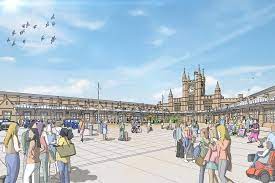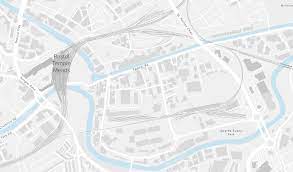A key development scheme described as a once in a generation opportunity for Bristol has taken a step forward following a funding approval by Bristol City Council’s cabinet.
The regeneration of Temple Quarter and St Philip’s Marsh could create 22,000 new jobs, up to 10,000 new homes and boost the city’s economy by £1.6bn a year. 
One of the UK’s biggest regeneration projects, it will transform more than 130 hectares of brownfield land on the edge of the city centre around Temple Meads railway station over the next 25 years.
The scheme’s vision for the immediate area around Temple Meads train station, pictured, is to “create a sustainable and flourishing new urban area, a place that is welcoming to all – to live, work, study, enjoy leisure time and builds on Bristol’s strengths as a world-class city”.
The complex project needs significant initial investment to kick start its initial phases, and while a £95.6m business case is currently awaiting government approval, the cabinet’s approval of an interim funding bid of £2.26m will sustain momentum in the programme and ensure that key initial phases can move ahead.
The funding will go to the West of England Combined Authority (WECA), one of the project partners, to create new and improved access and passenger facilities at Temple Meads station, making the area better connected to the rest of the city and beyond, so bringing benefits to citizens and businesses.
The bid will also support a comprehensive engagement programme on a development brief for Mead Street, off Bath Road – one of the first sites coming forward for development – as well as the emerging Temple Quarter and St Philip’s Marsh Development Framework. 
Mayor of Bristol Marvin Rees said: “The Temple Quarter and St Philip’s Marsh regeneration will bring about the long-awaited renewal of a city centre site, transforming it into a sustainable, well-connected urban area with a series of thriving, mixed-use communities.
“By creating thousands of jobs and homes in the city centre and a £1.6bn annual boost for our economy, it will bring opportunities for citizens and growth for businesses, while tackling the challenges posed by the ecological and climate emergencies head on.
“Our business case to government demonstrates how the regeneration will be a regional and national asset for levelling up the UK economy and creating clean, sustainable growth. We need to keep up the momentum of this vital project so the funding bid to WECA will move on key initial phases.
“This includes a Development Brief for Mead Street and an extensive engagement programme to hear the views of citizens and businesses to make sure the emerging Temple Quarter and St Philip’s Marsh Development Framework supports their individual and businesses aspirations and needs of their communities.”
Following endorsement by chief officers of North Somerset, South Gloucestershire and Bath &North East Somerset councils, the WECA Joint Committee will review the Cabinet funding bid on Friday.
A review of project funding next spring will agree next steps, following the outcome of the business case to government.






























